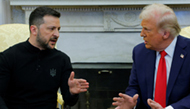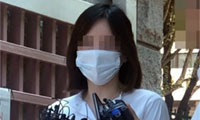Produced in Champagne, but the Name Cannot Say So
CHAMPAGNE, Switzerland - Makers of sparkling wine in the United States, Russia and Ukraine can appropriate the Champagne name for their products, but an innocent biscuit maker in this tiny Swiss town is out of luck.
Marc-Andre Cornu was salmon fishing in Norway when he got word.
His secretary was on the line, saying that lawyers for the Swiss distributors of French Champagne had written to say he could no longer use the brand name his family had used since the 1930s. Three generations, beginning with his grandfather, had labeled their baked goods “de Champagne,’’ after their Swiss village, nestled among the vineyards that creep north from the shores of Lake Neuchatel.
In 1998, Switzerland reached an accord with the European Union that allowed its former national airline, Swissair, to make stopovers in European Union cities. In return, Switzerland, which is not a member of the union, agreed to forbid the people of Champagne, population 710, to use the town’s name on their products.
In this agreement, the Europeans were doing the bidding of France, ever vigilant about defending the integrity and identity of Champagne. But that vigilance has not extended to threats from the United States and other big countries. In 2001, Swissair went bankrupt, and its successor, Swiss International Air Lines, is owned by Lufthansa. Yet now, Mr. Cornu, 46, and his baked goods company, which employs about 80 people, including his children, risk a fine if they invoke the name of their town. So, too, do the winemakers here, who in the best of years before the ban sold about 110,000 bottles of their light, nonsparkling wine, but now, without the Champagne label, are down 70 percent.
The local people have organized demonstrations to draw attention to their plight.
“Our goal is not to be the bin Ladens of wine, to be terrorists or ideologues, said Albert Banderet, 59, the former mayor who grew grapes until he entered public administration, leaving the vineyards to his son. “But wine is a reality here.
The French say they are struggling to protect an Appellation d’Origine Controlee, or A.O.C., a convoluted certification that authenticates the content, method and origin of a French agricultural product.
“Why is it worth so much to us? asked Daniel Lorson, spokesman for the Interprofessional Committee of the Wines of Champagne, a trade group in Epernay, France. “To prevent it from becoming a generic name, on yogurt or toothpaste, and lose its authenticity.
That’s why we carry the fight daily.
Mr. Lorson says it was not his committee that began the mess. A few years ago, a Swiss vintner sold about 3,000 bottles of wine under the name Champagne to a French supermarket chain. An anti-fraud agency, which inspects food stores, reported them.
In 2004, the last year the villagers could use “Champagne’’ on their wine labels, they sold 110,000 bottles. By last year, sales had plummeted to 32,000. The vintners have tried using names like Libre Champ, Champagnoux and C-Ampagne. “Those were really artificial names, Mr. Bindschedler said. “It’s deadly not to be able to use your own name.
Mr. Cornu said French Champagne makers obtained a court order in Paris in 2005 barring him from making and selling products with the brand name “de Champagne, and from using his company’s Web site.
He accuses the French of bullying tiny Switzerland. “They are less aggressive toward Russia, Ukraine or the United States, he said, where the French allow the use of the name Champagne as a semi-generic term for sparkling wine. “We have a problem understanding this.
스마터리빙
more [ 건강]
[ 건강]이제 혈관 건강도 챙기자!
[현대해운]우리 눈에 보이지 않기 때문에 혈관 건강을 챙기는 것은 결코 쉽지 않은데요. 여러분은 혈관 건강을 유지하기 위해 어떤 노력을 하시나요?
 [ 건강]
[ 건강]내 몸이 건강해지는 과일궁합
 [ 라이프]
[ 라이프]벌레야 물럿거라! 천연 해충제 만들기
 [ 건강]
[ 건강]혈압 낮추는데 좋은 식품
[현대해운]혈관 건강은 주로 노화가 진행되면서 지켜야 할 문제라고 인식되어 왔습니다. 최근 생활 패턴과 식생활의 변화로 혈관의 노화 진행이 빨라지고
사람·사람들
more많이 본 기사
- 황하나, 남편 사망→캄보디아서 남친과 출산..귀국 후 구속 ‘파란만장’
- 보수 야당 “의원직 사퇴하고 법심판 받아야”…김병기에 총공세
- 태국-캄보디아, ‘101명 사망’ 교전 20일만에 휴전
- 젤렌스키 미국행… “레드라인 있지만 타협점 찾을 수 있어”
- NASA 신임 국장 “美, 트럼프 임기내 달에 다시 갈것”
- 국힘 “신천지로 통일교 특검 물타기 안돼”…與 “성역없이 규명”
- 뉴욕시 폭설에 항공기 수천편 취소·지연 사태
- 마지막 토요일도 도심 집회… “내란 … 1
- 쿠팡 ‘정부 반박’ 영문성명 미묘한 표현차… ‘잘못된 비난’ 부각
- 오윤아 “子, 학교 떨어져 잘못 키웠나..방치 했나 싶어 눈물”
- 새해 맞아 백만 달러 상금 증정 이벤트와 다양한 설 행사 선보여
- IS 확실했나…트럼프 ‘성탄절 나이지리아 폭격’ 갸우뚱
- 올해 美 기업 파산신청 증가… “관세·고물가·고금리 원인”
- “아동 수출국 오명 벗는다” 70년 만에 해외입양 중단
- 트럼프 “소말릴란드 아는 사람 있나?”…이스라엘 승인에 ‘NO’
- 황하나, 마약 도피 중 캄보디아서 출… 1
- ‘손흥민 감격의 첫 우승’ 올해 축구계 기적 톱8 선정 ‘선수로는 유일’
- 소싯적 ‘치기어린’ 주소 “굿바이”…지메일 주소변경기능 도입
- “올해 최고 주목받은 테크 거물은 머스크 아닌 래리 엘리슨”
- 특검, ‘로저비비에’ 김기현 부부 기소…尹 뇌물 수사는 경찰로
- [이지 사이언스] “온난화 막으려면 세계인구 44% 식단 바꿔야…문제는 소고기”
- 미국, 美방산기업 제재한 中에 “대만 무기판매 보복 강력반대”
- 러, 트럼프-젤렌스키 종전회담 직전 … 1
- 작년 운용자산 5조5천억달러…갑부들의 ‘패밀리오피스’ 월가 새 강자로
- “솔직히 자신은 없죠” 3루수 GG 송성문, 유격수도 아닌 외야라니... 생존 본능 발동할까
- ‘김건희에 로저비비에 선물’ 김기현 부인 특검 재출석…곧 기소
- 찰스 3세, 내년 방미 추진…트럼프에 英왕실 ‘매력 공세’될까
- ‘서해 공무원 피격 은폐’ 혐의 서훈… 2
- “2025년 높이뛰기는 우상혁과 커의 무대” 세계육상연맹 조명... 우상혁도 “커와 계속 경쟁해야 해”
- LA 등 서부에 사흘째 폭우…동부엔 폭설 예보
- 우크라이나 포로수용소의 북한군인 동무들에게
- ‘NCT 탈퇴’ 태일, 성폭행 혐의로 결국 감옥行..징역 3년 6개월 확정
- 韓정부, 노란봉투법 해석 지침 공개… 하청 임금·근로조건 좌우하면 ‘진짜 사장’
- “출생시민권은 사기”⋯ 이민 2세대 공격 초점 맞춘 트럼프
- “SD서 최고 활약 김하성, 2024시즌만큼만 쳐줘도 ATL 3승 더한다” ESPN 극찬
- “엔비디아, AI칩 스타트업 인수 아닌 기술 계약으로 규제 회피”
- ‘학자금 상환’ 안하면 임금압류
- ‘패션왕’ 뷔의 45가지 특별한 순간...日하퍼스바자 생일 특집 컬렉션
- 러, 젤렌스키 미국행 앞 대규모 공습…우크라도 러에 드론 공격
- 16세로 성장한 버클리 문학, 성대한 송년 파티
- 뉴욕에 3년만에 최대 폭설…항공기 수천편 결항·지연
- 8시즌 뛰고 ML 역대 17위 “오타니 GOAT 될 것”, ML 역대 50인 선정
- 물류거점창고에 불체자 8만명 수용 추진
- “올해 최고 주목받은 테크 거물은 머스크 아닌 래리 엘리슨”
- 대만이슈 돌출로 美中 ‘삐걱’…내년 4월 트럼프 방중前 기싸움?
- 루비오 국무장관, 트럼프가 민 온두라스 당선인과 통화… “명확한 승리”
- 국제은값 폭등에 개인투자자들 銀투자 대거 유입
- 한파에 고드름이 주렁주렁… 서울 이번 겨울 첫 한파주의보
- 트럼프, 종전안 들고오는 젤렌스키에 “내승인前엔 아무것도 없다”
- ‘마약 혐의’ 남양유업 3세 황하나 구속… “증거인멸 우려”
1/5지식톡

-
 미 육군 사관학교 West Poin…
0
미 육군 사관학교 West Poin…
0https://youtu.be/SxD8cEhNV6Q연락처:wpkapca@gmail.comJohn Choi: 714-716-6414West Point 합격증을 받으셨나요?미 육군사관학교 West Point 학부모 모…
-
 ☝️해외에서도 가능한 한국어 선생님…
0
☝️해외에서도 가능한 한국어 선생님…
0이 영상 하나면 충분합니다!♥️상담신청문의♥️☝️ 문의 폭주로 '선착순 상담'만 진행합니다.☎️ : 02-6213-9094✨카카오톡ID : @GOODEDU77 (@골뱅이 꼭 붙여주셔야합니다…
-
 테슬라 자동차 시트커버 장착
0
테슬라 자동차 시트커버 장착
0테슬라 시트커버, 사놓고 아직 못 씌우셨죠?장착이 생각보다 쉽지 않습니다.20년 경력 전문가에게 맡기세요 — 깔끔하고 딱 맞게 장착해드립니다!장착비용:앞좌석: $40뒷좌석: $60앞·뒷좌석 …
-
 식당용 부탄가스
0
식당용 부탄가스
0식당용 부탄가스 홀세일 합니다 로스앤젤레스 다운타운 픽업 가능 안녕 하세요?강아지 & 고양이 모든 애완동물 / 반려동물 식품 & 모든 애완동물/반려동물 관련 제품들 전문적으로 홀세일/취급하는 회사 입니다 100% …
-
 ACSL 국제 컴퓨터 과학 대회, …
0
ACSL 국제 컴퓨터 과학 대회, …
0웹사이트 : www.eduspot.co.kr 카카오톡 상담하기 : https://pf.kakao.com/_BEQWxb블로그 : https://blog.naver.com/eduspotmain안녕하세요, 에듀스팟입니다…
케이타운 1번가
오피니언

새해 더 중요해지는 노동법 준수

연말연시, 안전하고 차분하게
 캐슬린 파커 워싱턴포스트 칼럼니스트
캐슬린 파커 워싱턴포스트 칼럼니스트 [캐슬린 파커 칼럼] 지미 라이의 마지막 희망
 유경재 나성북부교회 담임목사
유경재 나성북부교회 담임목사 [한국춘추] 미국의 힘
 전병두 서북미수필가협회 회원
전병두 서북미수필가협회 회원 [금요단상] 비자 발급
 박일근 / 한국일보 수석논설위원
박일근 / 한국일보 수석논설위원 [지평선] 스님의 주례사
 신상철 / 고려대 고고미술사학과 교수
신상철 / 고려대 고고미술사학과 교수 [미술 다시보기] 신의 모습을 닮고자 한 예술가
 스티브 강 전 한인민주당협회 회장
스티브 강 전 한인민주당협회 회장 [스티브 강 ‘인사이드 미국’] 2026 중간선거: 트럼프 지지율 하락이 말해주는 것
 김홍일 케이유니콘인베스트먼트 대표
김홍일 케이유니콘인베스트먼트 대표 [기고] 안정의 기준은 어떻게 제도가 되었나
1/3지사별 뉴스

물류거점창고에 불체자 8만명 수용 추진
도널드 트럼프 행정부가 이민자 구금·추방을 효율화하기 위해 전국 물류거점 창고에 8만명 규모의 수용시설 확보를 추진한다고 24일 워싱턴 포스트…
‘학자금 상환’ 안하면 임금압류

“온 세상에 희망·평화의 빛 스며들길”
가자지구와 우크라이나에서의 전쟁, 고립과 불평등으로 세상이 어지러운 가운데 워싱턴 지역 각급 한인교회와 성당들이 성탄절을 맞아 일제히 예배와 …
“연말은 스트레스·새해 결심은 없다”

“올해 최고 주목받은 테크 거물은 머스크 아닌 래리 엘리슨”
올해 미국에서 가장 주목받은 기술업계 거물은 일론 머스크 테슬라 최고경영자(CEO)가 아닌 래리 엘리슨 오라클 창업자·회장이라고 블룸버그 통신…
[새해부터 이렇게 달라진다] 최저임금 또 오르고… 유급 병가는 더 확대

오늘 하루 이 창 열지 않음 닫기 





















































.png)


댓글 안에 당신의 성숙함도 담아 주세요.
'오늘의 한마디'는 기사에 대하여 자신의 생각을 말하고 남의 생각을 들으며 서로 다양한 의견을 나누는 공간입니다. 그러나 간혹 불건전한 내용을 올리시는 분들이 계셔서 건전한 인터넷문화 정착을 위해 아래와 같은 운영원칙을 적용합니다.
자체 모니터링을 통해 아래에 해당하는 내용이 포함된 댓글이 발견되면 예고없이 삭제 조치를 하겠습니다.
불건전한 댓글을 올리거나, 이름에 비속어 및 상대방의 불쾌감을 주는 단어를 사용, 유명인 또는 특정 일반인을 사칭하는 경우 이용에 대한 차단 제재를 받을 수 있습니다. 차단될 경우, 일주일간 댓글을 달수 없게 됩니다.
명예훼손, 개인정보 유출, 욕설 등 법률에 위반되는 댓글은 관계 법령에 의거 민형사상 처벌을 받을 수 있으니 이용에 주의를 부탁드립니다.
Close
x